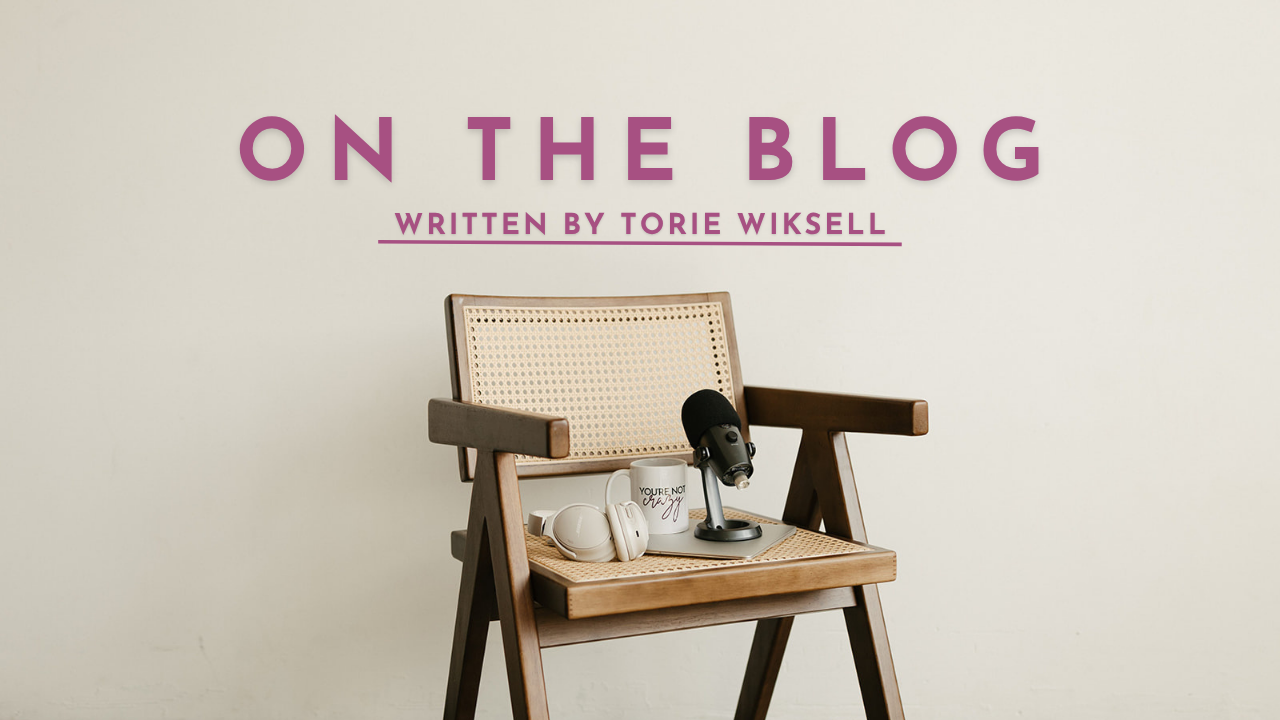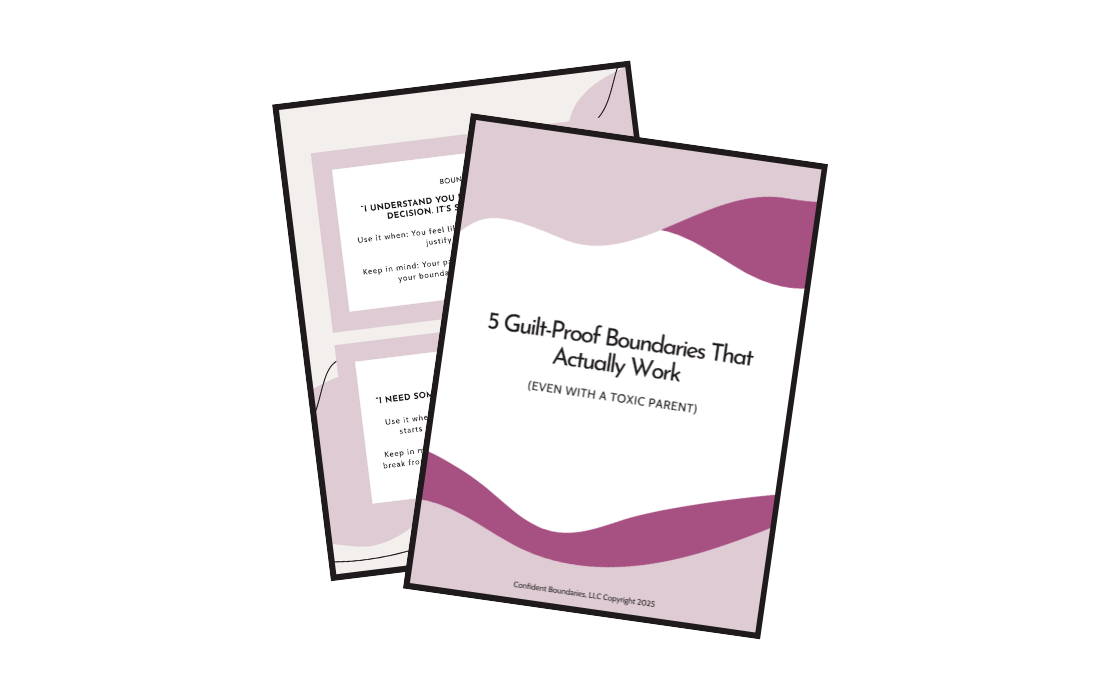
When Setting Boundaries With Your Parent Feels Impossible
Let me guess—you’ve tried to set boundaries with your parent before.
There’s this specific kind of exhaustion that comes from trying to set boundaries with a parent who refuses to hear you. You finally get the courage to speak up. You try to explain how their behavior is affecting you. Maybe you even rehearse what you’re going to say ahead of time. You try to be calm. Gentle. Clear.
And still—it's a disaster.
They lash out. Or collapse into tears. Or accuse you of being the worst person ever. And suddenly, you’re the one left questioning yourself...
→Was I too harsh?
→Am I making this a bigger deal than it actually is?
→Maybe I am being selfish…
And so the toxic cycle continues.
You either give in to keep the peace (and what feels like your last tiny bit of sanity), or you stand firm and deal with the dramatic (and exhausting) fallout. Either way, it feels pretty lose-lose.
More guilt. More second-guessing. More of that familiar, hopeless feeling: It’s always going to be like this, isn’t it?
You’re Not Overreacting. And You’re Definitely Not Alone.
If you grew up with a parent who was emotionally unpredictable, manipulative, or deeply self-absorbed, then you already know:
This isn’t just about miscommunication.
It’s about a pattern. One where your needs are seen as threats. Where your “no” is treated like betrayal. Where even the idea of a boundary feels like an invitation for drama.
And the worst part? You’ve probably been convinced along the way that things will never get better. That you are doomed to live in this reality forever.
But here’s the thing nobody tells you: if you're dealing with a parent who has traits of borderline or narcissistic personality disorder, the rules are different. Of course your boundaries haven't worked (yet)- you didn't know the rules.
Why Traditional Advice Doesn’t Work
Most boundary advice assumes the other person is emotionally mature enough to hear you. It assumes they want to repair the relationship. That they care about your perspective. That they’re capable of self-reflection and taking accountability for their actions.
But what happens when your parent:
- Turns every conversation into a guilt trip?
- Makes you feel like the villain for trying to take care of yourself?
- Flat-out ignores your requests and then plays the victim?
That’s not miscommunication. That’s manipulation. And the more you try to “do it right,” the more twisted and confusing it becomes.
That’s when people like us—cycle breakers, daughters of narcissistic mothers, adult children of emotionally immature parents—start wondering if we’re the crazy ones.
I’ve Been There Too.
I grew up with a mom who had narcissistic personality disorder (and a lot of BPD traits). I spent most of my life not knowing which version of her I was going to get- the "perfect mom" or the punishing one.
It was beyond stressful and completely exhausting.
As someone who has personally crawled out of that dysfunction and has devoted my career as a psychotherapist and coach to helping others do the same- I want you to know that things can get better.
And, more importantly- things getting better is completely within your control.
If You’re in the Thick of It Right Now…
If your relationship with your parent leaves you feeling drained, anxious, guilty, or like you’re constantly being pulled back into old patterns you’ve worked so hard to outgrow—please hear this:
You’re not broken.
You’re not too sensitive.
And you’re not overreacting.
You’re dealing with something really hard—and you’re doing the best you can. Unfortunately for you- you've been trained by your toxic parent to stay in this dysfunctional loop. That's why it's so hard to break free from it.
But that doesn’t mean you can’t learn a new way forward. You can break the toxic cycle you're in. You just need to learn how.
I Made Something That Might Help
I put together a free, on-demand workshop called:
Setting Boundaries With a Parent You Suspect Has Borderline or Narcissistic Personality Disorder
It’s short, practical, and deeply validating. If you’ve been struggling with the push-pull dynamic, the guilt, the gaslighting, the constant question of “Is it me?”—this workshop will help things start to click.
It’s not about fixing your parent. It’s about finally supporting yourself.
→ Click here to watch the free workshop
You'll walk away with clarity around:
- The secret to framing your boundary so your BPD/NPD parent is more likely to respect it
- How to manage guilt, fear, and anxiety so you don’t freeze or backtrack when setting boundaries
- Steps for enforcing your boundary when your parent pushes back—no more doubting yourself
You Don’t Have to Keep Trying to Figure This Out On Your Own
Most people won’t get it. They’ll tell you to “just have a conversation” or “try to see it from your mom’s perspective.” They'll tell you that "your dad probably meant well."
But we know better.
We know what it’s like to leave a family gathering feeling like you need to sleep for a week because you're so exhausted. We know what it’s like to be told, “But they love you,” when love is the very thing that’s been used to control you. We know how lonely it feels to be the one who’s trying to break the cycle—without a map, and with everyone else telling you you’re the problem.
That’s why I made this workshop.
Because you deserve a space where someone finally says:
You’re not crazy. You’re not the villain. And you’re definitely not alone.
You’re just trying to heal in a family system that doesn’t want you to change. And I’m here to walk you through it.
→You can watch the workshop here.
Take what you need. Leave the rest. I’m rooting for you.
-Torie
You’re Not Crazy.
But you might have been gaslit by your parents.
Learn how to recognize the signs—and start rebuilding trust in yourself.
I hate SPAM. I will never sell your information, for any reason.



